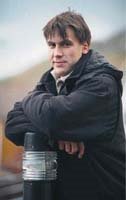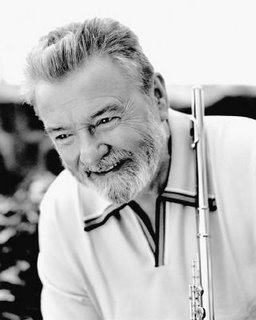Shallow Beauty: Galway's Gala at the NSO
 Rossini overtures in concerts are like little tarts: impeccably delicious appetizers, sufficiently light to leave room for the following courses. The Semiramide is a little on the big-boned side but offers enough moments where the full orchestra has to tiptoe through delicate passages.
Rossini overtures in concerts are like little tarts: impeccably delicious appetizers, sufficiently light to leave room for the following courses. The Semiramide is a little on the big-boned side but offers enough moments where the full orchestra has to tiptoe through delicate passages.
The National Symphony Orchestra played through it amiably (if without particular distinction) this Thursday; opening what was essentially a Sir James Galway Night in a gay and inviting way.
Following Rossini it was Norwegian composer Fred Jonny Berg’s Flute Mystery that took over, receiving its world premier by the famous flutist. The young (33) autodidact from north of the Arctic Circle finished this work for flute, string orchestra, and harp before offering the dedication to Mr. Galway. Mr. Galway’s acceptance is already telling about the work: melody and tunefulness are more important than wilful exploration of random sound-worlds while challenging the soloists to the very limits of his technical abilities. (Galway is said to have suggested to a composer of just such a modern piece that he pay him – Galway – for his practice time if he was to accept the dedication.)
Flute Mystery is one long lyrical, even sedate, passage that leads into a bird-fluttering, friendly-busy section (it comes across like sitting around with a somber Norwegian all night and then catching him laugh out loud, suddenly) before receding into calm. Romantically lapping against conservative musical shores, it is a work in which beauty exceeds harmlessness and comfort, innovation. If it will hold up to repeated hearing isn’t obvious quite yet – but it will be, because the work in its immense initial appeal is bound to get many repeat hearings. The comparison to film music would be an obvious one to make (especially since the composer also works extensively with video), if only there was high quality film music these days. And although accurate, the suggestion that Mr. Berg’s tone poem for flute is a not-too distant relative of New Age music would be selling his work short.  A Mozart Flute Concerto performance and mentioning that Mozart hated the flute (but that you wouldn’t be able to tell from the music) are as ubiquitous as mentioning the riot when talking about Le Sacre du Printemps. With that task artfully out of the way, I am left to mention hardly less obvious points: That Mozart’s concertos for flute – here it was no. 2 K. 314 which started life as an oboe concerto – are so damned beautiful that you can’t help but like it. And that Sir James’ technique is as prodigious as ever. Whereas in the Berg there was a lot of air in his alto-flute sound, the soloists steered its smaller cousin, the C-flute, with routine bordering flawlessness. A flourish-laden cadenza only further underlined that impression.
A Mozart Flute Concerto performance and mentioning that Mozart hated the flute (but that you wouldn’t be able to tell from the music) are as ubiquitous as mentioning the riot when talking about Le Sacre du Printemps. With that task artfully out of the way, I am left to mention hardly less obvious points: That Mozart’s concertos for flute – here it was no. 2 K. 314 which started life as an oboe concerto – are so damned beautiful that you can’t help but like it. And that Sir James’ technique is as prodigious as ever. Whereas in the Berg there was a lot of air in his alto-flute sound, the soloists steered its smaller cousin, the C-flute, with routine bordering flawlessness. A flourish-laden cadenza only further underlined that impression.
As far as I care, the NSO can’t play enough Mozart. Not because they are so good at it but because they get better every time and because it is such important music to play for therapeutic reasons. Enough Haydn and Mozart assures that the musical blood of the orchestra doesn’t coagulate as it would with a too-rich, gluten rich all-Romantic diet. That’s not to say we ought not enjoy the sumptuous, reach meal of a work like Also sprach Zarathustra which lured the audience back from intermission.
Daniel Ginsberg, James Galway Lends His Pied Piper Magic to NSO (Washington Post, October 6) Charles T. Downey, James Galway Meets Nietzsche (DCist, October 6) |
Richness of sound (alas with occasionally drowned out harps) and variance of timber were in full display with the NSO. It’s a work with which Maestro Slatkin can hit his stride – although trading a little more flavor and a more even flow for acrobatics and theatricality on display might have suited the performance well. Concert Master Nurit Bar-Josef stood out in the solo violin section and came close to the Bavarian-Austrian folk-music spirit in these parts. (Strauss’ Zarathustra happens to wear Lederhosen.)
Tickets for the Galway-Gala (enjoy the tear-moistened Danny-boy encore) should be in ample supply for the remaining performances today, Friday, at 7PM (!) and tomorrow, Saturday, at 8PM.




















































